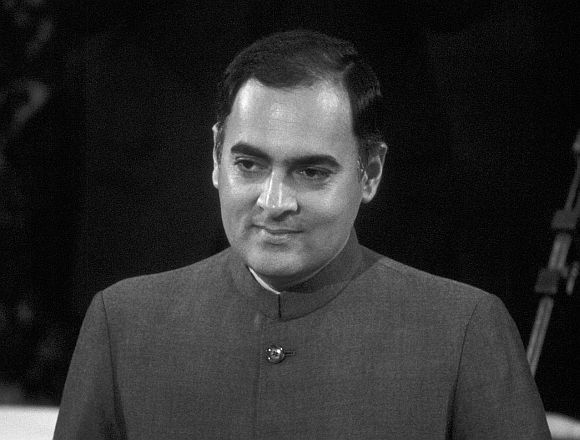 | « Back to article | Print this article |
 On Wednesday, August 12, External Affairs Minister Sushma Swaraj referred to Madhya Chief Minister Arjun Singh's memoir as part of her response on the 'Lalitgate' issue.
On Wednesday, August 12, External Affairs Minister Sushma Swaraj referred to Madhya Chief Minister Arjun Singh's memoir as part of her response on the 'Lalitgate' issue.
Swaraj alleged that then prime minister Rajiv Gandhi allowed Union Carbide Chairman Warren Anderson safe passage after he was arrested for the Bhopal gas disaster to secure the release of Adil Shahryar, the son of an old Nehru family friend, who was serving 35 years in a US prison.
Who is Adil Shahryar? Why was he imprisoned and what was his relationship to Rajiv Gandhi?
Adil Shahryar is the son of Muhammad Yunus who was an old friend of the Nehru family, a nephew of Badshah Khan Khan Abdul Ghaffar Khan, a former ambassador to Spain and long time chairman of the Trade Fair Authority of India.
Shahryar was a childhood friend of Rajiv Gandhi and his brother Sanjay Gandhi.
Shahryar was arrested on August 30, 1981 by Florida state authorities in Miami on charges of attempting to set fire to his room at the Sheraton Beach Hotel.
Shahryar was tried on five counts: 1. attempting to firebomb a ship; 2. false statements on various certificates in connection with the shipment; 3. mail fraud; 4. making of a firearm (the bombs); and 5. use of a firearm (the bombs) in the commission of a felony.
It was established in court that Shahryar's company, the Caribbean International Investment Corporation, had a contract with the Britain-based Shapton Products Ltd to supply them with 25,000 video cassettes. It was also established that Shahryar substituted the aforementioned shipment with scrap paper.
Shahryar intended to set the shipment on fire in order to claim $243,750 (nearly Rs 2.2 million at the then exchange rates) from the American Express bank. Shahryar claimed innocence of any scheme to defraud either the bank or Shapton.
Hollywood star Charlton Heston wrote to then US attorney general William French Smith in 1982, asking him to intervene in Shahryar's case.
The case was assigned to Smith's then special assistant, John G Roberts Jr, now the Chief Justice of the US Supreme Court.
Roberts reviewed the case and prepared a memo clarifying that Heston's version of events was incomplete.
He drafted a letter from Smith that constituted a polite brush-off to Heston.
You can read Heston letter's HERE.
In the aftermath of the Bhopal gas tragedy, the Congress government, it is alleged, permitted then Union Carbide chairman Warren Anderson to return to the US.
In 1985, President Ronald Reagan commuted the sentences of 13 people who had been in prison for violations of federal laws. Reagan signed the clemency papers on June 11, 1985, the day Rajiv Gandhi arrived in Washington, DC, for a State visit.
According to Sushma Swaraj, quoting from then Madhya Pradesh chief minister Arjun Singh's memoir, the Rajiv Gandhi government allowed Anderson to flee as a quid pro quo arrangement with the US for giving Shahryar a presidential pardon.
At the time of Shahryar's release, Rajiv Gandhi told India Abroad (the oldest and best-known Indian-American newsweekly, which Rediff.com has owned since April 27, 2001) that he had not asked that his friend's sentence be commuted, but added, 'We do believe that he has been wrongly imprisoned.'
Image: Then prime minister Rajiv Gandhi.